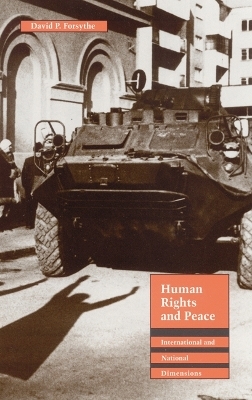
Human Rights and Peace
International and National Dimensions
Seiten
1993
University of Nebraska Press (Verlag)
978-0-8032-6880-7 (ISBN)
University of Nebraska Press (Verlag)
978-0-8032-6880-7 (ISBN)
Analyzes and discusses the dimensions of cover and overt human rights violations and how they militate against the establishment of democracies in the Third World. This book evaluates critically the argument that human rights in general and democracy in particular contribute to peaceful international relations.
As our world becomes a truly global village through instantaneous media transmission of events, the relationship between human rights and peaceful international relations receives more and more attention. David P. Forsythe's book analyzes and discusses the dimensions of cover and overt human rights violations and how they militate against the establishment of democracies in the Third World. Part One describes the paradox of internationally recognized human rights standards and international violence. Forsythe draws a crucial comparison between the lack of overt force between industrialized democracies and the use of covert force by certain democracies against some elected Third World governments. Part Two deals with human rights and intrastate violence. A creative framework of analysis, centering on the concept of political legitimacy, is illustrated by case studies of Sri Lanka, Liberia, and Romania. Forsythe shows that, in different ways and in different situations, the violation of human rights standards can be correlated with political revolution. Human Rights and Peace evaluates critically the argument that human rights in general and democracy in particular contribute to peaceful international relations.
As our world becomes a truly global village through instantaneous media transmission of events, the relationship between human rights and peaceful international relations receives more and more attention. David P. Forsythe's book analyzes and discusses the dimensions of cover and overt human rights violations and how they militate against the establishment of democracies in the Third World. Part One describes the paradox of internationally recognized human rights standards and international violence. Forsythe draws a crucial comparison between the lack of overt force between industrialized democracies and the use of covert force by certain democracies against some elected Third World governments. Part Two deals with human rights and intrastate violence. A creative framework of analysis, centering on the concept of political legitimacy, is illustrated by case studies of Sri Lanka, Liberia, and Romania. Forsythe shows that, in different ways and in different situations, the violation of human rights standards can be correlated with political revolution. Human Rights and Peace evaluates critically the argument that human rights in general and democracy in particular contribute to peaceful international relations.
David P. Forsythe is a professor of political science at the University of Nebraska-Lincoln. His publications include The Internationalization of Human Rights, The Politics of International Law, Human Rights and World Politics, and U. S. Foreign Policy.
| Erscheint lt. Verlag | 1.12.1993 |
|---|---|
| Verlagsort | Lincoln |
| Sprache | englisch |
| Maße | 133 x 203 mm |
| Gewicht | 312 g |
| Themenwelt | Recht / Steuern ► EU / Internationales Recht |
| Recht / Steuern ► Öffentliches Recht ► Völkerrecht | |
| Sozialwissenschaften ► Politik / Verwaltung | |
| ISBN-10 | 0-8032-6880-7 / 0803268807 |
| ISBN-13 | 978-0-8032-6880-7 / 9780803268807 |
| Zustand | Neuware |
| Haben Sie eine Frage zum Produkt? |
Mehr entdecken
aus dem Bereich
aus dem Bereich


